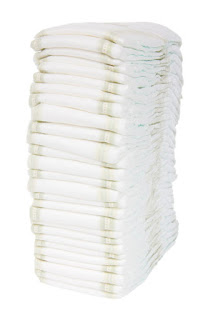The easiest choice when diapering your baby is disposable
diapers. It just doesn’t get more convenient than a disposable
diaper. When soiled, just take off and throw away. Simple. No need
to soak the diaper and then wash. This is why millions of parents
around the globe choose disposable diapers. There are even disposable
swim diapers like Huggies Little Swimmers.
Another worry parents have about disposable diapers is the use of dioxin, a carcinogenic chemical that can cause cancer. Many countries have banned the use of this chemical, but not the United States. But, again, most think that the chemical does not come in direct contact with your baby’s skin as it is only a bi-product of the bleaching process and is therefore nothing for parents to worry about. If you are worried about this chemical consider a natural disposable diaper like Seventh Generation diapers.
However, although cloth diapers do not take up room in a landfill, no one is 100% sure that they are a better option, environmentally speaking, for the planet. A lot of water is consumed when using cloth diapers. First, it takes a lot of water to grow the cotton used to produce cloth diapers, and if the cotton is not organic, also a lot of pesticides that pollute the ground. Second, large quantities of water are used laundering the cloth diapers after each use. In drought-stricken areas or in areas that need to conserve water, cloth diapers might not be an environmentally friendly option for diapering your child.
Are Disposable Diapers Safe?
However, disposable diapers have a bad reputation. Many parents worry about using disposable diapers due to the chemicals used for absorbency in many of the diapers. One of the main chemicals used in the lining of disposable diapers is sodium polyacrylate, which is a super-absorbent that becomes gel-like when wet. This is what holds in the liquid in your baby’s diapers and prevents leaks. It is also used in female sanitary napkins and adult diapers. It was used in tampons until the 1980s when it was then discovered that direct skin contact with the absorbent can increase the risk for toxic shock syndrome. However, most doctors and scientists believe that this product will not cause your baby any harm since it is inside the diaper and not directly on your baby’s skin. (Although be sure not to allow your baby to play with diapers, tearing their lining or chewing on their internal absorbents.)Also read:
 |
| Disposable Diapers |
Another worry parents have about disposable diapers is the use of dioxin, a carcinogenic chemical that can cause cancer. Many countries have banned the use of this chemical, but not the United States. But, again, most think that the chemical does not come in direct contact with your baby’s skin as it is only a bi-product of the bleaching process and is therefore nothing for parents to worry about. If you are worried about this chemical consider a natural disposable diaper like Seventh Generation diapers.
Environmental Concerns?
Further adding to the bad image for disposable diapers, is the fact that they are not very biodegradable. It is estimated that 27.4 billion disposable diapers are used each year in the United States and that 92% of these end up in landfills. Scientists think that it takes anywhere from 250-500 years for diapers to decompose in these landfills. Some companies now make biodegradable disposable diapers, but scientists say that in an air tight landfill not even biodegradable products can break down.However, although cloth diapers do not take up room in a landfill, no one is 100% sure that they are a better option, environmentally speaking, for the planet. A lot of water is consumed when using cloth diapers. First, it takes a lot of water to grow the cotton used to produce cloth diapers, and if the cotton is not organic, also a lot of pesticides that pollute the ground. Second, large quantities of water are used laundering the cloth diapers after each use. In drought-stricken areas or in areas that need to conserve water, cloth diapers might not be an environmentally friendly option for diapering your child.










0 comments:
Post a Comment